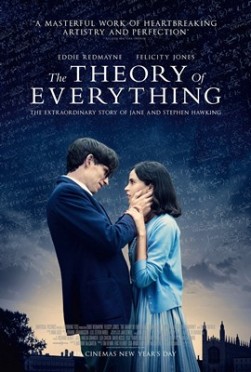
It’s impossible to know how realistic Eddie Redmayne’s portrayal of the life of Stephen Hawking really is, but the fact that Hawking, on seeing the film, allowed his now patented voice to be used in place of a replica suggests they’ve done a good job. The Theory of Everything covers an impressive amount of ground, from Hawking’s early student days, to his diagnosis and the greater part of his career, through the lens of his complicated relationship with first wife Jane, on whose memoir the film is based.
With all that to compete with, Hawking’s science doesn’t get much of a look-in. While the film finds novel and perceptive ways to portray his struggles with disease and relationships, it falls back on the usual scientist biopic clichés for the rest, as brilliant, excitable, slightly manic grad students explain the secrets of the universe to their friends and family using such comforting analogies as washing powder or peas. What is it about science biopics and foodsplaining? How often do scientists really, in a fit of inspiration, reach for their pints/crisp packets/roast dinners to explain what they’re thinking? It’s never happened to me.
Meanwhile, PhD students in particular may be irritated by the extraordinary ease of Hawking’s doctoral viva. A dramatic pause, followed by ‘all there is to say is well done.’ Really, Roger Penrose?
Most reprehensible is that old favourite, the miraculous flash of inspiration. It’s difficult, admittedly, to ask a mainstream film to account for how Hawking came up with his Hawking radiation theory in any real detail. The choices available are either the standard crazy scientist working feverishly montage (so wonderfully parodied by the big bang theory https://www.youtube.com/watch?v=iTV5Sg00Qt8) or the flash of genius inspired by the everyday moment. In this film, we get the latter. His head adorkably stuck inside a jumper, Hawking sees a halo of light from the fire in his room, and there it is, like magic. The theory which will make his name.
The reality would be harder to portray – presumably hours upon hours of staring and scribbling – but it’s a pity the cliché is reinforced. It suggests, once again, that the brilliant scientist is somehow alien, his or her insights impossible for us to understand or emulate.
But perhaps it doesn’t matter. The science, really, is playing second fiddle to the real subject of the film – the story of Hawking’s fight against the slow, cruel wastage of motor neurone disease. Here, no detail is spared. There is no false narrative of miraculous triumph (except, oddly, in the trailer, which effectively creates its own fictional narrative by jumbling up clips). Eddie Redmayne is brilliant, from the smallest hints of a curved hand holding a champagne glass through every ensuing physical change. There is even comedy – his friends resting him in the arms of a statue of Queen Victoria at Cambridge, or using the wheel chair to play Daleks with his children. Rather than a hindrance, the film manages to make Hawking’s artificial voice an integral part of the drama. To see the final, awful words which end his marriage to Jane first typed on a screen she can’t see, before they are spoken aloud, is doubly heartbreaking. It all feels very starkly real.
This verisimilitude is thanks to Redmayne’s extraordinary performance, which elevates what would have been a fairly decent film to something remarkable. It’s a wonderful, understated transformation, covering every stage of Hawking’s physical decline. The voice, the physicality, the expressions are uncannily convincing. Who can blame the film makers for not resisting the shot where a middle aged Hawking, mid lecture, day dreams about unfurling himself from his wheelchair and walking backwards through the stages of the disease? It’s the film’s one self-indulgent flourish.
It’s also the moment which integrates the two strands of the story. Hawking’s attempts to ‘reverse time’ through his theories, applied to his own, irreversible condition. It leaves us wondering what is meant by a ‘theory of everything’. We can understand the disease, yes, but the why of it remains a mystery.
Reviewed by Sarah Day
THE THEORY OF EVERYTHING
Working Title Films. James Marsh (Dir); Written by: Anthony McCarten (screenplay), Jane Hawking (book). Starring: Eddie Redmayne, Felicity Jones, Tom Prior. Showing - everywhere.